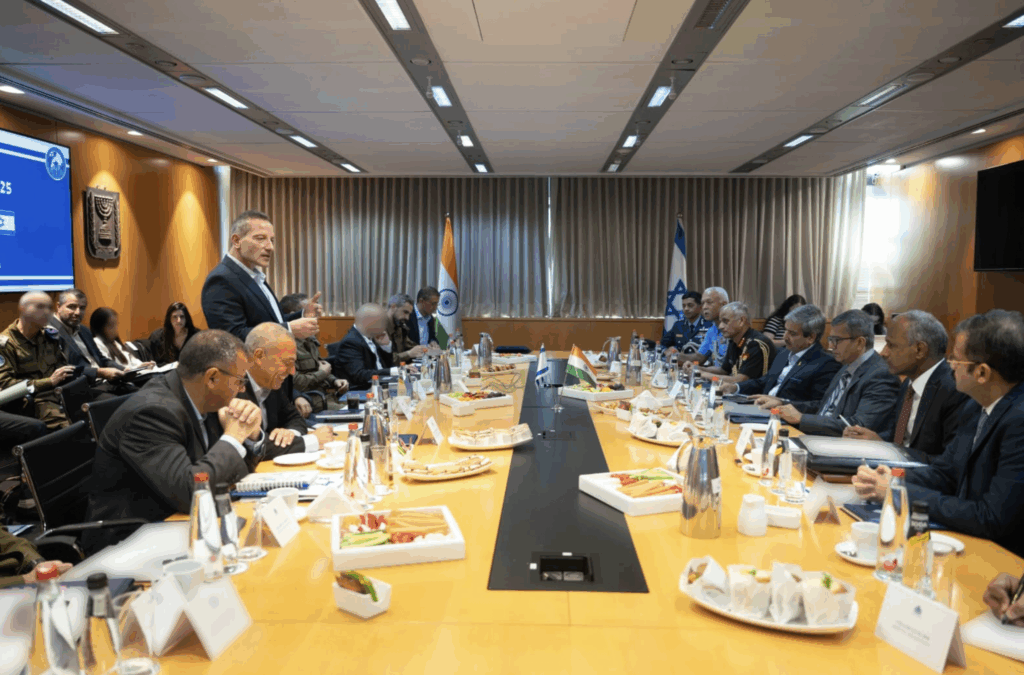World
India and Israel Strengthen Defense Cooperation with New MOU

On March 5, 2024, Israel and India solidified their defense collaboration by signing a new Memorandum of Understanding (MOU) aimed at enhancing defense, industrial, and technological cooperation. The announcement was made by the Israel Ministry of Defense during the annual meeting of the Joint Working Group (JWG) between the two nations, marking a significant step in their evolving strategic partnership.
Amir Baram, Director General of the Israel Ministry of Defense, emphasized the importance of this partnership, stating, “Our strategic partnership is based on deep mutual trust and shared security interests. We view India as a first-rate strategic partner and are determined to continue deepening cooperation in the fields of defense, technology, and industry.” While the specific details of the MOU remain unclear, the signing underscores the commitment of both countries to bolster their defense ties.
Engagement with Israeli Defense Industry
During the meetings, the Indian delegation engaged with executives from major Israeli defense firms, including Rafael Advanced Defense Systems, Israel Aerospace Industries, and Elbit Systems. These companies have previously collaborated with India through joint ventures aligned with India’s Make in India initiative. Over the past decade, Israeli defense industries have entered into agreements worth billions of dollars with India, focusing on areas such as air defense and unmanned aerial systems (UAS).
The Israeli Ministry of Defense noted that “innovative and groundbreaking Israeli technologies were presented, along with ideas and projects aimed at deepening industrial-defense partnerships between Israel’s defense industries and India.” Senior officials from various defense sectors in Israel participated in these discussions, showcasing the high level of commitment to this partnership.
Included in the Indian delegation were senior representatives from the Ministry of Defence and the Armed Forces, highlighting the significance of this collaboration for national security. One area of potential collaboration is India’s recently announced Mission Sudarshan Chakra, aimed at developing an integrated air and missile defense system, which aligns closely with Israel’s expertise in missile defense technologies.
Broader Regional Cooperation
Israel’s Foreign Minister Gideon Sa’ar was unable to attend the MOU signing, as he was visiting India to meet with his counterpart, Subrahmanyam Jaishankar. During their discussions, Sa’ar expressed gratitude for India’s support amid ongoing conflicts, particularly following the October 7, 2023 Hamas attack. He noted, “There is already a warm friendship between our countries. Our goal is to build a long-term strategic partnership between the countries.” Sa’ar also highlighted the importance of regional partnerships, referencing initiatives like I2U2 and IMEC, which aim to foster cooperation among India, Israel, the UAE, and the United States.
This enhanced cooperation with India is part of Israel’s broader strategy to expand its presence in Asian markets for defense products. Israeli defense companies are actively seeking opportunities in various regions, as evidenced by their participation in the ADEX exhibition in Seoul from October 17-24, where leading firms showcased their capabilities.
The new MOU represents a commitment from both countries to strengthen their defense relationship, with potential implications for regional security and economic collaboration. As the strategic partnership develops, it is poised to adapt to the evolving security landscape in both nations.
-

 Science3 weeks ago
Science3 weeks agoInterstellar Object 3I/ATLAS Emits Unique Metal Alloy, Says Scientist
-

 Politics3 weeks ago
Politics3 weeks agoAfghan Refugee Detained by ICE After Asylum Hearing in New York
-

 Business3 weeks ago
Business3 weeks agoIconic Sand Dollar Social Club Listed for $3 Million in Folly Beach
-

 Health3 weeks ago
Health3 weeks agoPeptilogics Secures $78 Million to Combat Prosthetic Joint Infections
-

 Science3 weeks ago
Science3 weeks agoResearchers Achieve Fastest Genome Sequencing in Under Four Hours
-

 Lifestyle3 weeks ago
Lifestyle3 weeks agoJump for Good: San Clemente Pier Fundraiser Allows Legal Leaps
-

 Science3 weeks ago
Science3 weeks agoMars Observed: Detailed Imaging Reveals Dust Avalanche Dynamics
-

 Health3 weeks ago
Health3 weeks agoResearcher Uncovers Zika Virus Pathway to Placenta Using Nanotubes
-

 World3 weeks ago
World3 weeks agoUS Passport Ranks Drop Out of Top 10 for First Time Ever
-

 Entertainment3 weeks ago
Entertainment3 weeks agoJennifer Lopez Addresses A-Rod Split in Candid Interview
-

 Business3 weeks ago
Business3 weeks agoSan Jose High-Rise Faces Foreclosure Over $182.5 Million Loan
-

 Top Stories3 weeks ago
Top Stories3 weeks agoChicago Symphony Orchestra Dazzles with Berlioz Under Mäkelä









